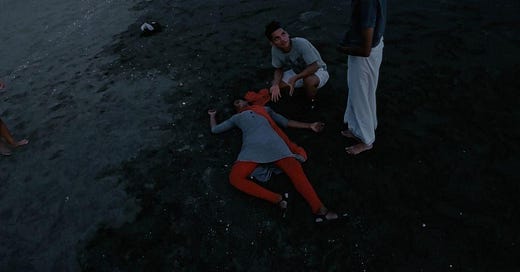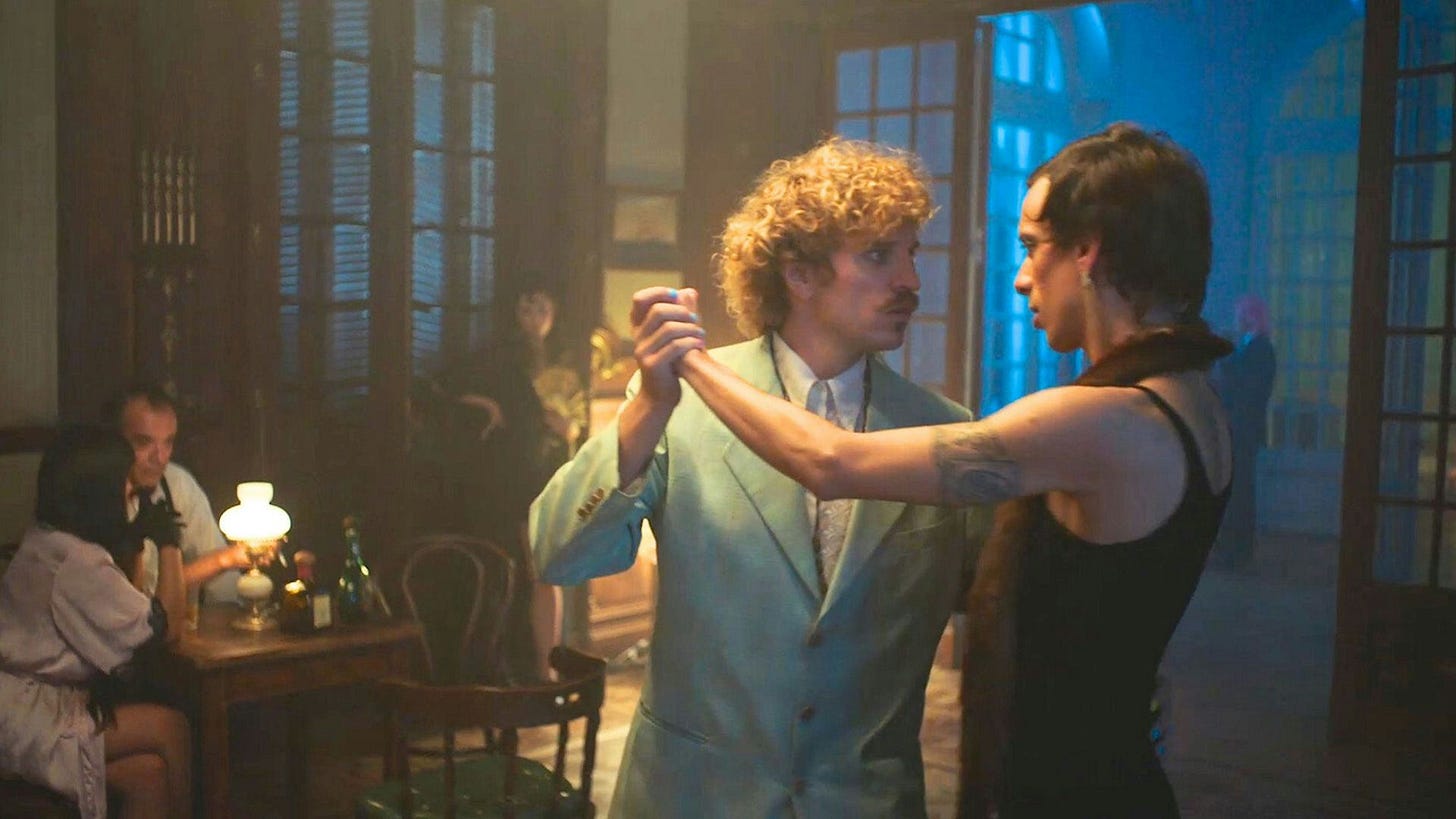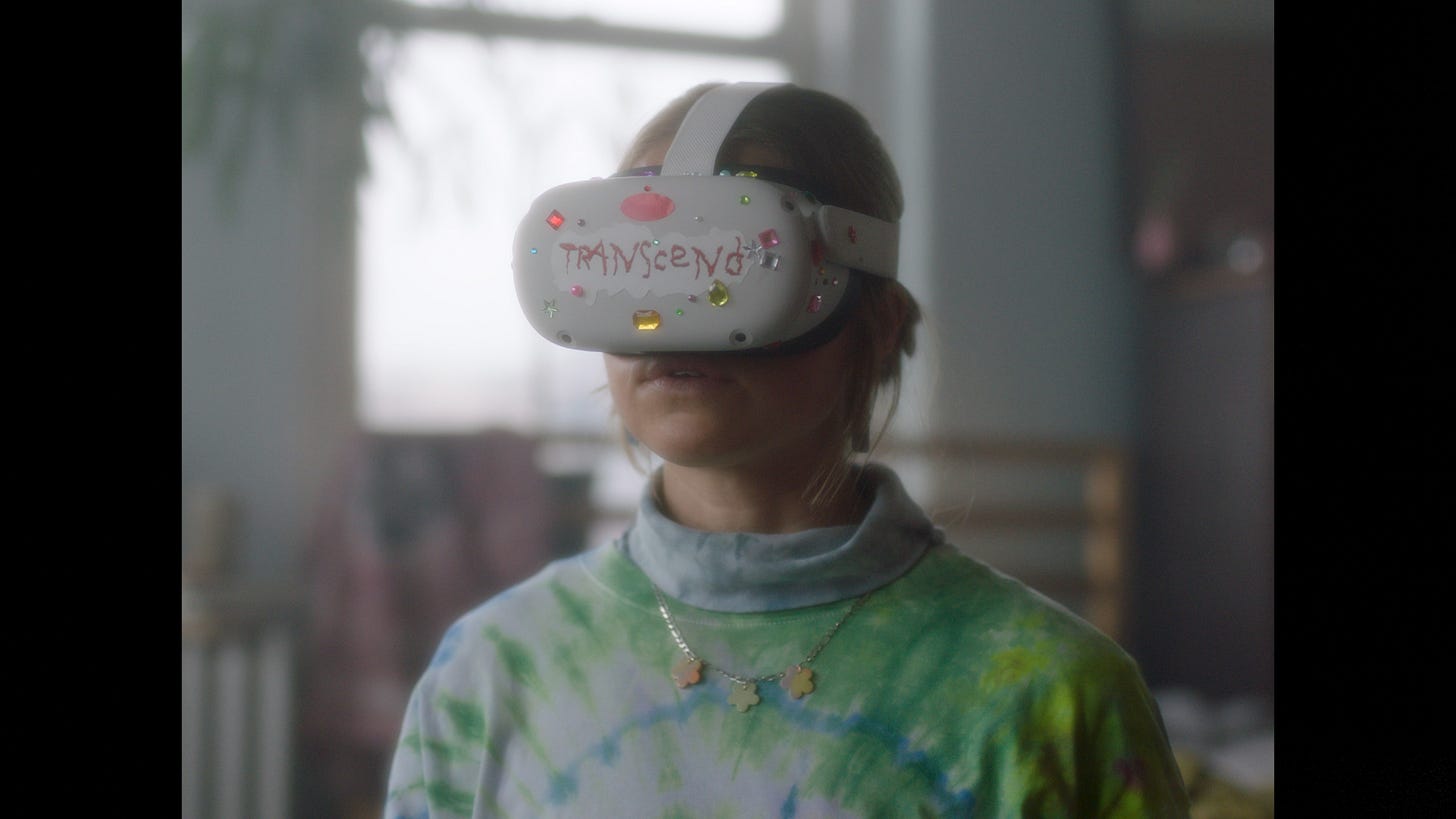Two films I saw at the New/Next Festival in Baltimore used a 360 degree camera, like the kind used on Google Street View and dog videos on TikTok. In the comedy Removal of the Eye, about a woman trying to finish her doctorate with a young baby and a mother showing signs of dementia, someone says the 360 camera is what all the anthropologists are using now to create video content because it’s an empathy machine, providing all perspectives at once. (Her mother tries to shove it down the toilet.)
But then Eduardo Williams’s The Human Surge 3 was filmed with a 360 camera, and whenever it got too close to its subject the person or plant or building would warp and distort. Williams uses this effect to make the world and its people strange and unfamiliar, holding them at a distance. He follows figures we never learn anything useful about, as they travel from one country to another. Or, not so much travel, because there are no borders or machines of conveyance — in the same way that they dodge our attention, their image fragmenting just as they get close enough to be perceived, they seem to slide and float from one place to another. Each individual speaks a different language, and it is mostly a repetition of nonsense phrases. Do they understand each other? Does it matter?
This goes on for two hours. In the first hour, I found it delightful, the way one scene doesn’t transition to the next so much as each scene dreams up the next one, compounding weirdness until at some point a vortex forms to delete everything that came before it only to seemingly start over as if nothing happened. Without a narrative or character or clear image to hold on to, for two hours you just have to make meaning out of whatever is in front of you. “This is what modern travel is like,” I thought at one point. “Skimming the surface, held at a remove from everything and everyone, your view distorted and failing to make sense of what you hear.” But anyone could just as easily think anything else about the film, it will hold all of these perspectives it does not care.
At the beginning of hour two of this I moved from delight to indignation; how dare these filmmakers etc etc. You can’t just throw every perspective into a two hour film, choose one!!!!! But by the time it was over I was back in delight. A lot of people left the theater during my screening. I agreed, yes, leave, it doesn’t matter. Every moment is an entry point and an exit point.
This was the second New/Next Film Fest held in Baltimore. The first one was held in 2023, in the absence of the annual Maryland Film Festival. The MFF had decided not to hold an event that year, due to post-pandemic issues. But the MFF had been a different kind of creature, much like its base, the Parkland Theater. Opened with much to-do after a grand restoration project, the Parkland was used mostly to show the same superhero movies you could see at the suburban mall. The MFF also failed to show any real ambition or identity, trying to please everyone, and by everyone I mean the kinds of families who donate money to enormous arts nonprofits. So, a lot of international and independent films about heartwarming subjects, a lot of feel good documentaries, a lot of mush.
New/Next immediately came with ambition and identity. The fest is programmed by Eric Allen Hatch, who has also been instrumental in the creation and curation of Beyond Video, Baltimore’s video rental shop that is also a kind of locus point for the city’s film scene. The selection is comprehensive (you can find the latest Marvel film as well as the latest restoration project from Vinegar Syndrome), but it’s arranged and staffed in such a way as to foster curiosity and enthusiasm.
That transfers over to the film festival, theaters were packed for early morning screenings of debut films, compilations of shorts, and the tiniest of productions. This year’s program had expanded, adding an extra day and an extra screen to its offerings. But its focus is still on the handmade and the experimental, work that seems rooted in specific places and made out of scenes. A lot of the shorts and one of the longer films, Corey Hughes’s Your Final Meditation, are made in Baltimore with local crews and actors.
One of my favorites from the festival was the documentary The Dells, about young guest workers brought in from abroad to work in the Wisconsin tourism industry as hotel domestic workers, restaurant servers, retail salespeople, amusement park laborers. Director Nellie Kluz has a light touch, letting the young people’s naivete about the United States and the disillusionment that comes from pop culture-fueled fantasies clashing with the reality of American life, their summer romances and flirtations, and their financial precarity play out on screen without much interference or ideological heavy-handedness. In the screening it was paired with Home, a short film directed by Beatričė Bankauskaitė that follows a young mother in Missouri forced to live out of a long stay motel with her kids and work multiple gigs to make ends meet. Home, too, let the events play out without managing viewers’ interpretation.
Which is what New/Next seems to do, allowing its enthusiastic audience to see new filmmakers and stories and ideas play out without the interference of too much buzz and hype. There were a lot of things I couldn’t see, due to scheduling conflicts with something that seemed slightly more urgent, and I’m not sure if they’ll play or stream near me again. But what a wonderful antidote to a film culture that mostly isn’t diversified but is instead still, despite the variety of streaming services and international festivals and publications and forums and critics, focused only on a small handful of films a year.
Much of film culture is now about access and association. People go to film festivals less to see new work but to have exclusive, pre-release access to the enviable object. When Martin Scorsese’s Killers of the Flower Moon played at European festivals, critics and influencers flocked to social media not to say something of substance about the complicated (and ultimately middling) film but to rhapsodize about it. Masterpiece! Triumph! What they were really advertising was themselves, and the fact that they had been bestowed with an all-access pass.
The subject of the New York Film Festival discourse this year was not about any of the movies playing but mostly about the Criterion closet van. Only certain filmmakers, actors, and other VIP film people are invited to make the Criterion Closet video. Let loose inside the archive of Criterion’s collection, people like Cate Blanchett, Bill Hader, and Winona Ryder gasp and moan as they select a few gems from the history of film to flash to the camera and say how formative these films were. The enthusiasm is not insincere, or at least not largely insincere. But it’s not the enthusiasm that is contagious but about being selected as special and noteworthy enough that your gasps of joy and nostalgia are worthy.
Which is why when Criterion set up a mobile version of their closet for the attendees of the New York Film Festival to create their own videos of selecting a handful of movies from their collection and reminiscing about their first time seeing them, people waited in line for over ten hours. Which is fine, people want to mimic what they see on social media, and they see Willem Dafoe talking about Michael Haneke and they want to be as cool as Willem Defoe. But then we got film people writing about their own visits the closet in the AV Club, the Cut, the New York Times, on and on. The van didn’t have any exclusive items, nothing that wasn’t available on the internet or at your local Barnes and Nobles. But it’s not cool to shop at Barnes and Nobles. It doesn’t imply access and exclusivity. Why bother liking something if you can’t be envied for it?
Recommended:
The Department of Defense is hiring writers! But it’s to wage war. :(
Graham Dethmers wrote about the problems with a new Agnes Varda biography, written for “t-shirt feminists, the kind that think wearing a famous woman’s name on a t-shirt matters in advancing the political or cultural program of feminist thought”:
Kill Your Idols
·“People’s response to [the elderly’s] separateness can be callous, can be goodhearted, and is always condescending.”










Oooohhh this all sounds so dreamy!! It makes me want to try and show up in Philly for the next one.